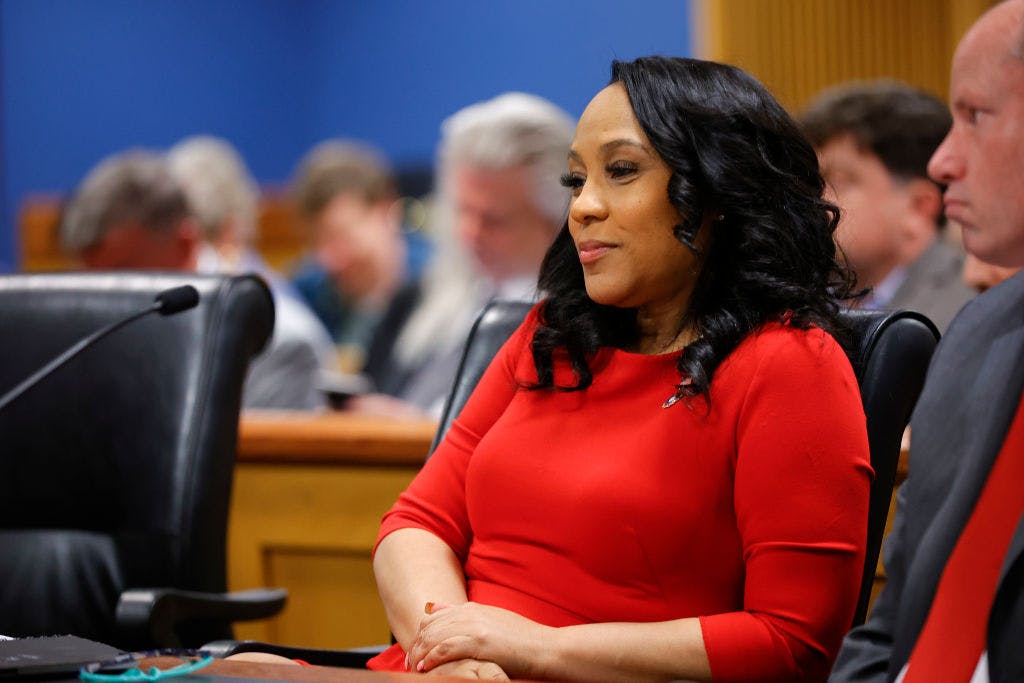Fani Willis Boasts That ‘the Train Is Coming’ To Convict Trump, but Will She Be the One To Conduct It?
The case is moving forward despite the possibility that the district attorney could soon be off it.

The promise from the district attorney of Fulton County, Fani Willis, that “the train is coming” with respect to trying President Trump and his co-defendants for racketeering and other crimes brings into focus her defiance in the face of efforts to disqualify her over a secret romance with her then handpicked special prosecutor.
The decision on whether to take up the disqualification issue now rests with the Georgia Court of Appeals after Judge Scott McAfee, who will hear the case, granted Mr. Trump et al. a “certificate for immediate appeal.” He ruled that either Ms. Willis or her former boyfriend and special prosecutor, Nathan Wade, had to exit the case. Mr. Wade, who has been paid $650,000 in taxpayer dollars, promptly resigned.
That departure sufficed as a “remedy” for Judge McAfee, who was otherwise scathing in his opinion. He detected an “odor of mendacity” wafting from Ms. Willis’s behavior, and faulted her for a “tremendous lapse in judgment.” He also found her responsible for a “significant appearance of impropriety,” but not for a disqualifying conflict of interest.
As Ms. Willis readies to persuade the review court to uphold that decision, she tells CNN that during the months-long adjudication of the disqualification issue, her office was “writing responsive briefs, we were still doing the case in a way that it needed to be done. I don’t feel like we’ve been slowed down at all.” She adds, “We’re not going to miss or skip a beat because of all the noise or distraction on one case. We’re going to continue to do our work.”
Judge McAfee allowed for such forward progress, writing that he “intends to continue addressing the many other unrelated pending pretrial motions, regardless” of whether the appeals court takes up Mr. Trump’s request, or how it rules if it does so. Ms. Willis warns of “efforts to slow down this train,” but for the moment, only her fate is encountering a red light.
The district attorney’s insistence that she is busy writing briefs telegraphs that she is conscious of the calendar. She calls the disqualification saga a “two-month sideshow that the judge should have not even let happen” and says, “Let’s get a trial date.” She has proposed that jury selection begin on August 5. If she is disqualified and a new prosecutor chosen, though, the case will likely not be heard before November’s election.
Judge McAfee’s decision to allow the case to proceed even while Ms. Willis’s fate is parked in limbo stands in marked contrast to the deep freeze in which Special Counsel Jack Smith’s January 6 prosecution finds itself. The issue there is presidential immunity, and whether Mr. Trump is entitled to it even though he no longer sits in the Oval Office. The Supreme Court will hear arguments on that question on April 22.
Mr. Smith’s and Ms. Willis’s cases overlap, meaning that their respective trains could be clacking along the same track. They both concern efforts to overturn the results of the 2020 election, and five out of six of Mr. Smith’s unindicted co-conspirators are defendants in the district attorney’s prosecution. If Ms. Willis is deposed and her case goes off the rails, the special counsel could indict those defendants — Mayor Giuliani and the attorneys John Eastman, Sidney Powell, Kenneth Chesebro, and Jeffrey Clark.
By the same token, if the Supreme Court is persuaded by Mr. Trump that he is entitled to an expansive species of immunity for his actions in the wake of the 2020 election — while he was still president — that ruling could neuter the Georgia prosecution, regardless of who is leading it. If Mr. Trump wins the election, a Georgia judge could choose to stay the case while he is in office.
An attorney for Mr. Eastman, Harvey Silverglate, tells the Sun that he predicts that Ms. Willis will be disqualified, and that the district attorney of a neighboring county could be tasked with replacing her. The decision would rest with the executive director of the Prosecuting Attorneys’ Council of Georgia. A new prosecutor could choose to keep the case in its current form, or revise it.

